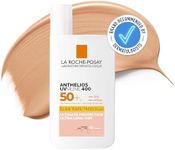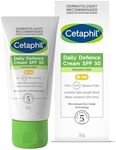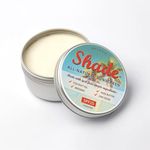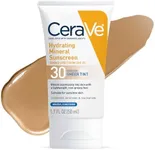Buying Guide for the Best Mineral Sunscreens
Choosing the right mineral sunscreen is crucial for protecting your skin from harmful UV rays while also catering to your specific skin needs. Mineral sunscreens use active ingredients like zinc oxide and titanium dioxide to physically block UV radiation, making them a popular choice for those with sensitive skin or concerns about chemical sunscreens. When selecting a mineral sunscreen, consider factors such as SPF rating, skin type compatibility, and additional benefits like water resistance or moisturizing properties. Understanding these key specifications will help you make an informed decision that best suits your lifestyle and skin care needs.SPF RatingSPF, or Sun Protection Factor, measures the sunscreen's ability to protect your skin from UVB rays, which are responsible for sunburn. The higher the SPF, the greater the protection. SPF ratings typically range from 15 to 50+. For everyday use, an SPF of 30 is generally recommended, as it blocks about 97% of UVB rays. If you have fair skin, are prone to sunburn, or plan to spend extended time outdoors, consider a higher SPF. However, no sunscreen can block 100% of UV rays, so it's important to reapply every two hours and after swimming or sweating.
Active IngredientsMineral sunscreens primarily use zinc oxide and titanium dioxide as active ingredients. These minerals sit on the skin's surface and physically block UV rays. Zinc oxide offers broad-spectrum protection against both UVA and UVB rays, while titanium dioxide is effective against UVB and some UVA rays. If you have sensitive skin or are concerned about chemical ingredients, mineral sunscreens are a great option. Choose a product with a higher concentration of zinc oxide for better UVA protection, especially if you are looking for comprehensive coverage.
Skin Type CompatibilityDifferent mineral sunscreens are formulated to cater to various skin types, such as oily, dry, sensitive, or combination skin. If you have oily skin, look for a lightweight, non-comedogenic formula that won't clog pores. For dry skin, opt for a sunscreen with added moisturizing ingredients like hyaluronic acid or glycerin. Sensitive skin types should choose fragrance-free and hypoallergenic options to minimize irritation. Understanding your skin type will help you select a sunscreen that not only protects but also complements your skin's needs.
Water ResistanceWater resistance in sunscreens indicates how long the product remains effective while you are swimming or sweating. Water-resistant sunscreens typically offer protection for either 40 or 80 minutes. If you plan to be active outdoors or spend time in the water, choose a sunscreen with water resistance to ensure continuous protection. Remember to reapply after the indicated time or after towel drying to maintain effectiveness.
Additional BenefitsSome mineral sunscreens come with additional benefits such as antioxidants, anti-aging ingredients, or tinted formulas. Antioxidants like vitamin C or E can help protect against free radical damage, while anti-aging ingredients like peptides can support skin elasticity. Tinted formulas can provide a subtle coverage, which is useful for evening out skin tone. Consider these additional benefits based on your personal skincare goals and preferences to enhance your sunscreen experience.















